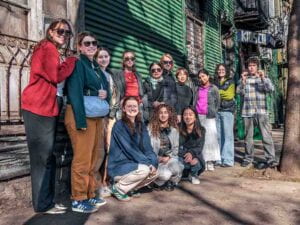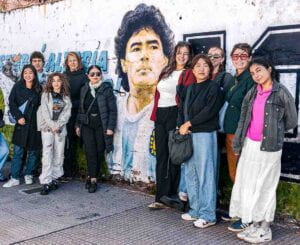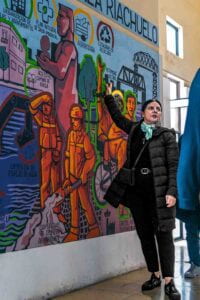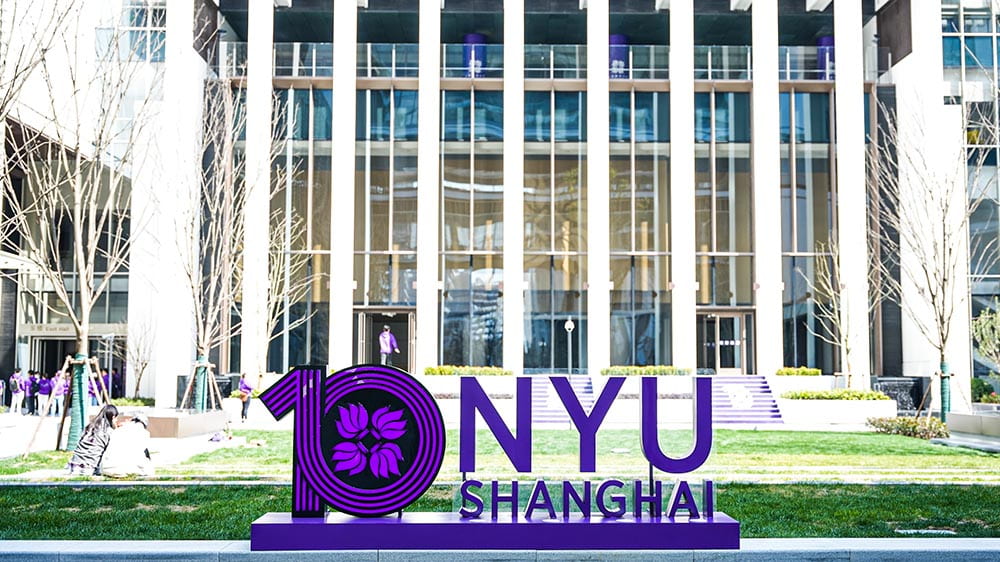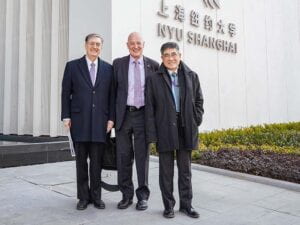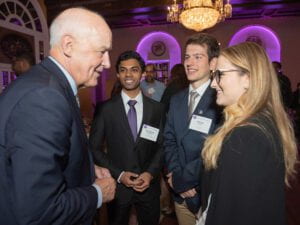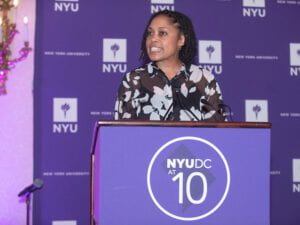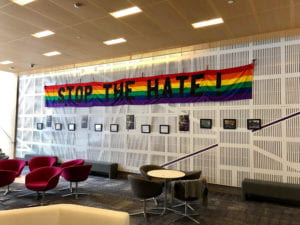
NYU Accra Professor Dr. Akosua Darkwah discusses academia in Ghana, her course on society, culture, and modernization in Ghana and NYU Accra, and more.
How did you come to be interested in sociology? What lead you to this field?
I always wanted to be a lawyer. As a child, I had a very strong sense of social justice and was convinced that with the law, I could fix every problem on earth. I entered college with that conviction and proceeded to intern with a lawyer who had a license plate with the inscription “I will sue.” I was sure I was in the right place; I would spend the summer suing all the people meting out injustices to others. I was in for a huge disappointment. The firm had a pro bono incest case; a nanny reported that a father of three girls had been consistently raping the youngest, aged six. The mother, when she was called into the office, admitted this but in the court, she would deny it. I was perplexed. Over the course of one summer where I interviewed the mother more closely, I came to the realization that law could go only so far in fixing this woman’s problems. Married straight out of high school and a stay at home mother, she was afraid of the consequences of having her husband prosecuted. She would have to become the breadwinner for her family and she was ill prepared to do that. Law could not help her with that. Social programs could. More importantly in terms of my career choices, I realized a fascination with understanding the set of structural factors that led individuals to make the choices that they make. I wanted to make sense of the social world in which I lived and sociology was the field of study best placed to help me do that.
2. In addition to your doctorate in sociology, I understand that you also have a B.A. in psychology and sociology? Have you found that your study of psychology has influenced your approach in your sociology work? If so, how?
I graduated from Vassar College where at the time you had to defend your choice of a double major. I remember saying something along the lines of psychology helping me to understand the individual and sociology the society in which that individual lived. I thoroughly enjoyed my psychology classes and still remember some of the concepts I learned back then. Honestly, though, I do not think that I draw on it much in my work as a sociologist. I focus primarily on structural forces in my work and the opportunities or lack thereof that it presents for women in terms of their work. I spend little time reflecting on what these means for the women’s sense of self or psychological well-being. Last year, however, I co-authored a piece with a psychologist which was published in Frontiers in Psychology. In that piece, we explored the extent to which women’s interdependent constructions of self deemed as crucial to well-being in collectivist societies was maintained in the context of social change which we explored using an intergenerational survey of women’s everyday lives that explored a wide array of issues such as educational opportunities, career options, reproductive health decisions and so on. This project forced me to reflect much more closely on the interactions between these two fields of study so who knows I may very well revisit my dual interests more systematically in future.
3. Your areas of research – from women in the informal economy, with a focus on trading in global consumer goods, to the implications of large foreign financial flows into Ghana’s oil region for Ghanaian youth employment prospects – are fascinating. What are you currently researching? And what topics do you find are most pressing in Ghana? What topics receive the most attention overseas?
An overriding theme in my research is to look at the implications of global economic principles or practices for Ghanaian women’s work. In my current research, I am exploring one of the responses to the global financial, energy and food crises, which is large scale land acquisitions. I am interested in its implications for women’s livelihoods and especially women’s responses to the shrinkage in livelihood options that these transactions present.
It’s hard for me to isolate a couple of topics as the most pressing in Ghana. I feel that everything deserves attention not just from sociologists like myself but from all the other academics whose areas of expertise help shed light on the richness of Ghanaian life.
In terms of gender and women’s studies, I think that overseas the three Ghanaian topics receiving the most attention are issues of domestic violence, women’s political participation and transformative women leaders.
4. You have contributed articles to books (including Women’s Labor in the Global Economy: Speaking in Multiple Voices, edited by Sharon Harley and published by Rutgers University Press in 2007) and engaged in collaborative research with other professors. Is this common for scholars in Ghana or something you have specifically sought?
Collaborative research is strongly encouraged at our university, be it with other scholars at the university, other universities in Ghana or outside of Ghana, so I am by no means unique in that respect. In my case, I had great mentors who early in my career encouraged me to think of myself as a scholar whose work would be recognized globally and pushed me to apply for or participate in events that would make such global recognition possible. The internet has also been amazing in that increasingly, I get invitations to contribute to joint projects or for speaking engagements from people who find me by looking online for scholars who work in the area that I do.
5. How did you come to also teach at NYU Accra?
I can’t remember exactly how this happened in terms of the recruitment process. I do know that in my early years at the university, I directed the Minnesota Studies in International Development (MSID-Ghana) project for the two year period that it run in Ghana so I did have a CV that showed my previous experience working with both international students and American students in particular. I may have been sought because of this, but to be honest, I cannot remember.
6. I understand you teach a course entitled Society, Culture and Modernization in Ghana at NYU Accra. Can you tell me a little about the course? How do you help foreign students to understand Ghana?
This course starts off with a theoretical discussion about concepts such as tradition, modernity and post-colonialism and uses these as lenses through which to understand Ghanaian social institutions. My primary goal is to help students appreciate our common humanity as well as the ways in which Ghana’s unique past especially its interactions with outsiders over the last 500 years has had an influence in one way or the other on our value systems and practices. Having grown up as a child who spent summers in various parts of Africa as well as living for a decade in the United States, I’m particularly attuned to the sense of feeling like a fish out of water in new spaces as well as the learnings that can come over time particularly with introspection and I try and bring that to bear on the class as well. So while there are specific issues I seek to discuss each week linked to the topic and readings for the week, I constantly invite students to bring their questions especially those borne out of the experience of living in Ghana to class even if it is unrelated to the subject under discussion. I find that invariably these have links to either issues already discussed or yet to be discussed in class and that experiential learning of this sort – learning borne out of personal experience and the questions that experience raises – helps students makes sense of the material in more concrete ways than text alone could.
Finally, not having attended college in Ghana meant that I myself was not introduced to much academic writing on Ghana as a student. I came to my academic career fully cognizant of this lacuna in my knowledge and have had to systematically seek to understand Ghana on my own not simply as a Ghanaian but also as a scholar. Teaching this class allows me an opportunity to see Ghana with fresh eyes every semester. In a sense then, it is not only the students who learn about Ghana each semester, I do as well and I think that part of what makes the class special is the co-learning that takes place in the class.
7. What kinds of students do you teach at NYU Accra? Do they come from a mix of majors and schools or are certain disciplines more represented than others? Are there certain aspects of your course that they find most compelling?
The students I teach at NYU Accra come from a wide variety of academic disciplines; I’ve taught history majors, biology majors, economics majors, music majors as well as sociology and anthropology majors.
I think that the most compelling aspect of the course is the way in which it unsettles the binary lens through which they view Africa, i.e as traditional as compared to the modernity of the part of the world from which they come.
8. If there were three things you would want the broader NYU community to know about Accra, academic scholarship in Ghana, or NYU Accra, what would they be?
This is a tough one to do because I have more than three things to say and cannot quite decide which is the top three for any so perhaps instead of doing three top things, I’ll do one for which. I think one of the least known facts about Accra is the fact that it has been home to others from the continent, the Diaspora and the Western world for more than two centuries; Accra has been home to Sierra Leoneans, Nigerians, returnees from Brazil for more than a century. It also has a long association with the Western world – the Dutch, the Danish and of course the British. In essence, issues of cultural diversity and integration is not new to the people of Accra and perhaps given the current global discussion of these issues, places like Accra may very well be the places to look to for ideas about how to do this.
As a relatively younger academic in Ghana, I think one of the more exciting facts about Ghanaian scholarship of today is the breadth of ideas that we seek to explore. There are far many more of us today than there were in my parents’ generation. We are no longer the first or one of the few in an area of study. There are growing numbers of us building a body of work in specific areas of study that enable us to understand Ghana better from our unique socio-cultural context.
NYU Accra offers students a unique opportunity to begin to understand the rich diversity of the African continent, one that unfortunately international media houses have done a very poor job of explaining. It offers students the opportunity to look beyond the stereotypical images of war, famine and disease that seems to be the narrative of Africa fed to the West and to begin to truly appreciate the fact that Africa is a continent of over 50 different countries, each of which offers something quite unique to the world at large.





